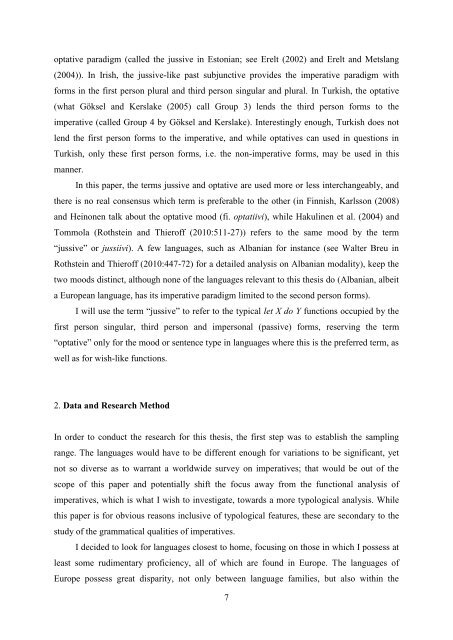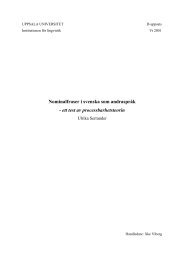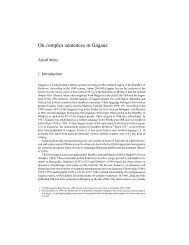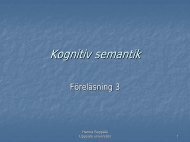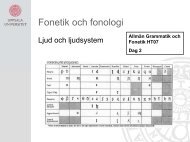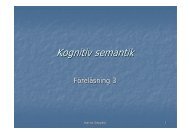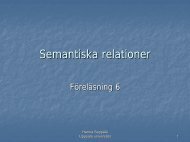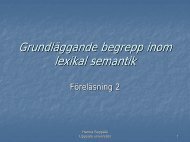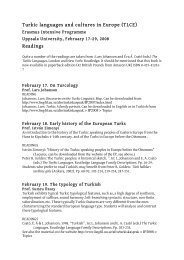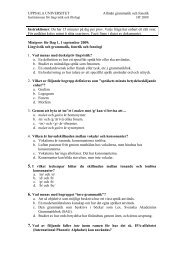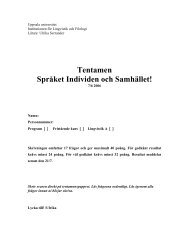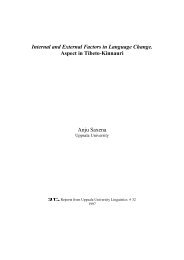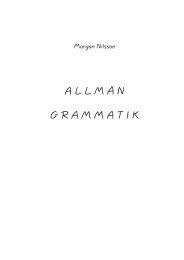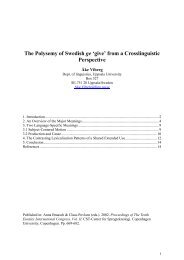The function of non-canonical imperatives in the languages of Europe
The function of non-canonical imperatives in the languages of Europe
The function of non-canonical imperatives in the languages of Europe
You also want an ePaper? Increase the reach of your titles
YUMPU automatically turns print PDFs into web optimized ePapers that Google loves.
optative paradigm (called <strong>the</strong> jussive <strong>in</strong> Estonian; see Erelt (2002) and Erelt and Metslang<br />
(2004)). In Irish, <strong>the</strong> jussive-like past subjunctive provides <strong>the</strong> imperative paradigm with<br />
forms <strong>in</strong> <strong>the</strong> first person plural and third person s<strong>in</strong>gular and plural. In Turkish, <strong>the</strong> optative<br />
(what Göksel and Kerslake (2005) call Group 3) lends <strong>the</strong> third person forms to <strong>the</strong><br />
imperative (called Group 4 by Göksel and Kerslake). Interest<strong>in</strong>gly enough, Turkish does not<br />
lend <strong>the</strong> first person forms to <strong>the</strong> imperative, and while optatives can used <strong>in</strong> questions <strong>in</strong><br />
Turkish, only <strong>the</strong>se first person forms, i.e. <strong>the</strong> <strong>non</strong>-imperative forms, may be used <strong>in</strong> this<br />
manner.<br />
In this paper, <strong>the</strong> terms jussive and optative are used more or less <strong>in</strong>terchangeably, and<br />
<strong>the</strong>re is no real consensus which term is preferable to <strong>the</strong> o<strong>the</strong>r (<strong>in</strong> F<strong>in</strong>nish, Karlsson (2008)<br />
and Hei<strong>non</strong>en talk about <strong>the</strong> optative mood (fi. optatiivi), while Hakul<strong>in</strong>en et al. (2004) and<br />
Tommola (Rothste<strong>in</strong> and Thier<strong>of</strong>f (2010:511-27)) refers to <strong>the</strong> same mood by <strong>the</strong> term<br />
“jussive” or jussiivi). A few <strong>languages</strong>, such as Albanian for <strong>in</strong>stance (see Walter Breu <strong>in</strong><br />
Rothste<strong>in</strong> and Thier<strong>of</strong>f (2010:447-72) for a detailed analysis on Albanian modality), keep <strong>the</strong><br />
two moods dist<strong>in</strong>ct, although <strong>non</strong>e <strong>of</strong> <strong>the</strong> <strong>languages</strong> relevant to this <strong>the</strong>sis do (Albanian, albeit<br />
a <strong>Europe</strong>an language, has its imperative paradigm limited to <strong>the</strong> second person forms).<br />
I will use <strong>the</strong> term “jussive” to refer to <strong>the</strong> typical let X do Y <strong>function</strong>s occupied by <strong>the</strong><br />
first person s<strong>in</strong>gular, third person and impersonal (passive) forms, reserv<strong>in</strong>g <strong>the</strong> term<br />
“optative” only for <strong>the</strong> mood or sentence type <strong>in</strong> <strong>languages</strong> where this is <strong>the</strong> preferred term, as<br />
well as for wish-like <strong>function</strong>s.<br />
2. Data and Research Method<br />
In order to conduct <strong>the</strong> research for this <strong>the</strong>sis, <strong>the</strong> first step was to establish <strong>the</strong> sampl<strong>in</strong>g<br />
range. <strong>The</strong> <strong>languages</strong> would have to be different enough for variations to be significant, yet<br />
not so diverse as to warrant a worldwide survey on <strong>imperatives</strong>; that would be out <strong>of</strong> <strong>the</strong><br />
scope <strong>of</strong> this paper and potentially shift <strong>the</strong> focus away from <strong>the</strong> <strong>function</strong>al analysis <strong>of</strong><br />
<strong>imperatives</strong>, which is what I wish to <strong>in</strong>vestigate, towards a more typological analysis. While<br />
this paper is for obvious reasons <strong>in</strong>clusive <strong>of</strong> typological features, <strong>the</strong>se are secondary to <strong>the</strong><br />
study <strong>of</strong> <strong>the</strong> grammatical qualities <strong>of</strong> <strong>imperatives</strong>.<br />
I decided to look for <strong>languages</strong> closest to home, focus<strong>in</strong>g on those <strong>in</strong> which I possess at<br />
least some rudimentary pr<strong>of</strong>iciency, all <strong>of</strong> which are found <strong>in</strong> <strong>Europe</strong>. <strong>The</strong> <strong>languages</strong> <strong>of</strong><br />
<strong>Europe</strong> possess great disparity, not only between language families, but also with<strong>in</strong> <strong>the</strong><br />
7


